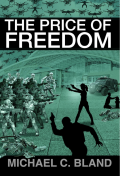
LitPick Review
The Price of Freedom is a sci-fi novel by Michael C. Bland that will keep you pinned to the edge of your seat. Set in America, where people are being controlled by the government using implanted devices, Dray Quintero, a fugitive, plans a rebellion against them. When he is caught and his family is captured, he begins to plot his escape, but The Agent, an agency working with the government, has the ability to read his thoughts and conversation with the use of the implant that has already been put in him (Dray). Now caught in a tight spot, Dray must work out his way to survival or end up becoming used by the government. Do you think he will make it out? If yes, what do you think the outcome would be?
Opinion:
My thoughts on The Price of Freedom center on three points: the author's writing, the characters, and the tone.
First, Bland's writing is straightforward, and this is because he does not waste time on wordy and lengthy descriptions of things. When the implants were newly introduced at the beginning of the book, he only spoke about their physical appearance such as how it protruded from the clothing of one of the agents. The author did not delve further into how it was wired and the connections done for it to work. Even though more descriptions could have helped me understand the device better, it is still forgivable given the quick pace of the book.
Second, one thing that differentiates The Price of Freedom from other sci-fi books I've read is the description of its main lead. The protagonist, Dray Quintero, was not portrayed as a flawless or perfect character; instead he is the opposite. Dray is a man shaped by the tragic trauma of having everything, including his children, taken from him by The Agents. He is also a person who is haunted by the dreadful loss of his loved ones and friends during the rebellion. These losses influenced his thoughts and decisions because he did not want to lose anyone again.
While Dray is a well-developed character, the other supporting characters lacked enough depth into their lives. However, I actually admired Dray's daughter, Talia, and her mental capabilities (the ability to hack into systems), which I believe were too advanced for her as a child. She used this to disable The Agent's system and help the family escape.
Lastly, the tone of the book was realistic. This is because there were no romantic or overly sweet words used, only pure emotions such as Dray's sadness at hearing his daughter cry from being tortured. Furthermore, in terms of realism, it echoes one characteristic of the modern world in which an ally or an enemy cannot be easily identified. When I read about the cause of Dray's and his family's arrest, I realized that his ex-wife, Mina, was solely responsible. She had conspired with Zion, the leader of The Agent and his men. In doing so, she betrayed her ex-husband and her children.
With these few points, I can conclude that the plot was filled with emotions and actions that captivated my attention. The book is appropriate for young adults and anyone interested in sci-fi genres because it will pique their interest.

